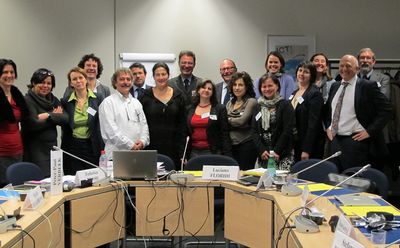The Onlife Initiative
The Onlife Initiative , also known as Concept Reengineering Think Tank is a project envisioned and implemented directly by the EC's Information Society DG[1]. It falls under the "Digital Futures" initiative. The project intends to explore the extent to which the digital transition impacts societal expectations towards policy making. Yiannis Laouris participates in the Think Tank, which is currently composed of 13 experts[2].
The rapid development and exploitation of digital technologies in all aspects of human life affects radically the human condition. For example, it modifies our relationship to ourselves, to others and to the world. It shakes established reference frameworks, in a number of different domains including (but not restricted to):
- The blurring of the distinction between reality and virtuality;
- The blurring of the distinction between human/machine/nature;
- The reversing from scarcity to abundance, when it comes to information;
- The reversing from the primacy of entities over interactions to the primacy of interactions over entities.
The working of the group is chaired by Prof. Luciano Floridi [3]. Person in charge from the EC is Nicole Zwaaneveld.
The Group has completed its work and released the ideas and thoughts in the form of a Manifesto. A special website[4] has been created by the Digital Futures Task Force to host online all results. The Manifesto was released during a special event attended by 120 experts across Europe on February 8, 2013. The whole event has been recoded and is available on line in the same pages.
OnLife Activities
Following the release of the Manifesto on February 8, 2013, the first next public presentation of the event, OnLife Manifesto: Being Human in an Hyperconnected Era, Yiannis Laouris, Pireaus Feb 16, 2013[5] took place in Greece, the mother country of Democracy. The speaker was Yiannis Laouris. The event was hosted by the University of Pireaus and the Hellenic Society for Systemic Studies.
